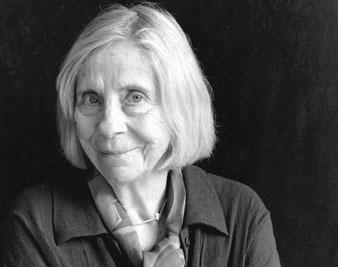One Art
BY PROF. VAROL AKMAN
"There's a struggle between one's ego and the poem. Because the poem really takes you and shakes you. And your ego becomes abject."
Barbara Guest was born Barbara Ann Pinson in Wilmington, N.C. in 1920. She died on Feb. 15, 2006 in Berkeley, CA. She spent her early youth in a range of Florida towns. She learned to read at age three, but being from a family of modest means, she was educated in a series of meager schools. At age ten, following her father's loss, the gifted child was sent to Los Angeles to live with relatives. She attended the University of California, Los Angeles, and the University of California, Berkeley, from which she graduated in 1943 with a degree in English. She then settled in New York City.
Guest was affiliated with the first generation of the New York School, together with John Ashbery, Kenneth Koch, Frank O'Hara, and James Schuyler. The School represented a refusal of so-called confessional poetry (John Berryman, Robert Lowell, and later, Anne Sexton and Sylvia Plath) and was greatly influenced by the abstract-expressionists, in particular Jackson Pollock and Willem de Kooning. (For several years in the early 1950s Guest was a reviewer for the journal Art News.)
In 1960, Guest attracted sympathetic notice with her first collection of poems, The Location of Things. She has since then published over twenty volumes of poetry, among them The Blue Stairs (1968); Moscow Mansions (1973); The Countess from Minneapolis (1976); Fair Realism (1989); Defensive Rapture (1993); and The Red Gaze (2005). She is also author of an experimental novel, Seeking Air (1978). Herself Defined, Guest's highly praised biography of Hilda Doolitle (H.D.) was written in five years.
Guest was always considered a "poet's poet," and her virtuosity was deeply esteemed by fellow artists. Only recently, however, has she become better known to the general public with the publication of her Selected Poems (1995). In 2008, Wesleyan University Press published her Collected Poems, about which Ann Lauterbach made the following observation: "Reading it is like sitting on the very edge of time, as each poem, each book, seems to surpass its own expectations, foraging and inventing in a ceaseless renovation of poetic energies. She envisioned, for generations to come, a future for lyric poetry."
Guest's honors include the Longwood Award, the San Francisco State Poetry Award, the Lawrence J. Lipton Prize, the Columbia Book Award, and a grant from The National Endowment for the Arts. In 1999, she earned the Robert Frost Medal for Distinguished Lifetime Achievement from the Poetry Society of America.
Guest's verse aims at both the eye and the ear, traveling across the imaginary artistic periphery between a painting and a musical piece. Her poems resist straightforward analysis and, in many cases, escape any elucidation at all. The following 1960 piece - with its stunning title and airy-cum-aqueous imagery - is perhaps a rather unique exception in this respect. In an article in Jacket (1985), Timothy Gray attributed the poem's force to "its refusal to resolve the inconsistencies and ambiguities lending love affairs their double nature, their wild mood swings, their careening traversals between the poles of allure and torture, passion and ennui." He also claimed that Guest successfully reproduced here with dazzling rhythm and turn of phrase the mood of love fashionable in 1950s America.
Parachutes, My Love, Could Carry Us Higher
I just said I didn't know
And now you are holding me
In your arms,
How kind.
Parachutes, my love, could carry us higher.
Yet around the net I am floating
Pink and pale blue fish are caught in it,
They are beautiful,
But they are not good for eating.
Parachutes, my love, could carry us higher
Than this mid-air in which we tremble,
Having exercised our arms in swimming,
Now the suspension, you say,
Is exquisite. I do not know.
There is coral below the surface,
There is sand, and berries
Like pomegranates grow.
…
